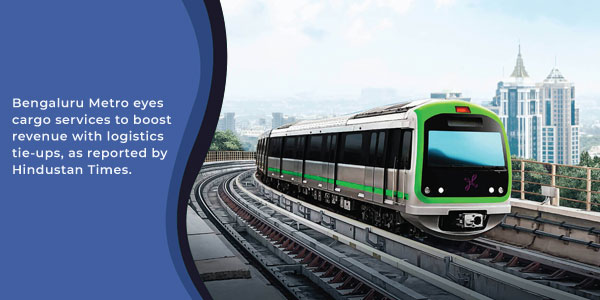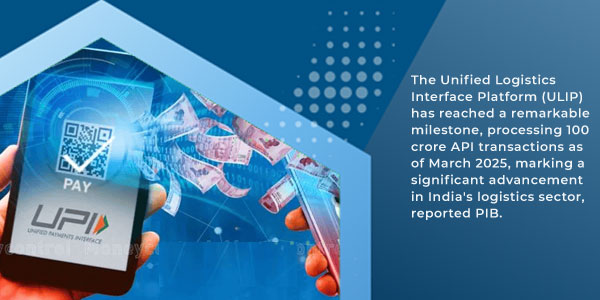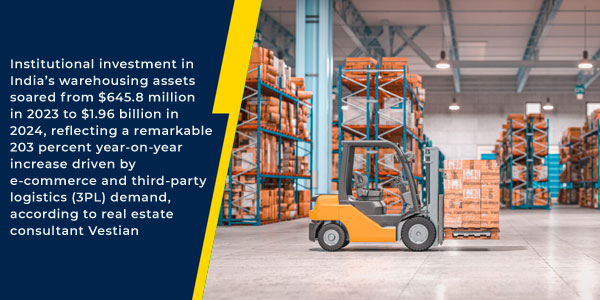March 2025

We create avenues for the industry to gain more insights into emerging trends, industry-specific problems of national importance, and global best practices in logistics & supply chain management. We enable the industry to cut down transaction costs, increase efficiency, and enhance profitability. We are committed to sensitizing the industry about macro-level issues and helping find solutions to them.
Govt Upgrading E-NAM To Enhance Accessibility for Small and Marginal Farmers. Bengaluru Metro Eyes Cargo Services to Boost Revenue. ULIP Reaches a Big Milestone. Logistics Startups Capitalizing on the E-Commerce Boom. Weighted Average Rentals ₹18-25 Per Sq Ft/Month Across Major Indian Cities: Vestian. Logistics Parks Are Reshaping India’s $5T Economy Vision. Gartner's Biggest 2025 Supply Chain Tech Trends Include Agentic AI, Polyfunctional Robots, ACWF.Rail & Logistics Firms Bet On “Middle Corridor” As Key Eurasian Route. German Pharma Industry Seeing a Shift Towards Active Temperature Control in Logistics. Qatar Is Unifying Freight Operations to Enhance Logistics and Cut Costs. Saudi Firms Sal Logistics Services and Sela Set to Develop A $1B Billion Logistics Center Near Riyadh. DB Schenker Strengthened Commitment to Sustainable Logistics with EVs. High Logistics Costs Hinder Africa’s Perishable Exports: Industry Voices. Kenyan Logistics Startup Leta Secures $5M Seed Funding.

|
| PIB reported that the government is upgrading the National Agriculture Market (e-NAM) platform to enhance efficiency and accessibility for small and marginal farmers. Minister of State for Agriculture and Farmers Welfare, Shri Ramnath Thakur, informed the Lok Sabha that numerous initiatives have been implemented to encourage farmers to engage with e-NAM for better price realization. Online registration is now available via the e-NAM portal and a mobile app, alongside training programs held in Agricultural Produce Market Committees (APMCs). As of February 28, 2025, 4,392 Farmer Producer Organizations (FPOs) were onboarded, allowing them to aggregate their produce for market access. The upgraded e-NAM 2.0 will incorporate features like bank account validation and eKYC compliance while facilitating logistics onboarding and other service providers. This move aims to address logistics challenges, reduce waste, and boost farmers' incomes through improved trade capabilities. |

|
| Bengaluru Metro eyes cargo services to boost revenue with logistics tie-ups, as reported by Hindustan Times. The Bangalore Metro Rail Corporation Ltd (BMRCL) plans to expand its operations into cargo transportation to increase non-fare revenue by collaborating with logistics and e-commerce firms. BMRCL Managing Director Mr. M Maheshwar Rao indicated that Byappanahalli is expected to be the project's central hub, aiming to enhance urban logistics efficiency. The initiative is structured to help both BMRCL and logistics companies, capitalizing on the metro's speed while generating additional income. A meeting with private logistics providers will be convened to finalize the strategy. The project aligns with broader goals to improve last-mile connectivity, ease traffic congestion, and decrease urban pollution. |

|
| The Unified Logistics Interface Platform (ULIP) has reached a remarkable milestone, processing 100 crore API transactions as of March 2025, marking a significant advancement in India's logistics sector, reported PIB. Launched by Prime Minister Shri Narendra Modi on September 17, 2022, under the National Logistics Policy, ULIP aims to create a seamless, technology-driven logistics ecosystem. Union Minister of Commerce & Industry Shri Piyush Goyal praised this achievement, attributing it to collaborative efforts among users, stakeholders, and government departments that enhance the ease of doing business and support India’s manufacturing ambitions. The platform facilitates automation, real-time cargo tracking, and regulatory compliance, benefiting businesses of all sizes, including major companies like Prism Johnson and Tata Steel. ULIP’s multi-modal APIs promote efficient inventory management and sustainability initiatives, while transporters utilize digital technologies to streamline operations. With over 1,300 registered companies and connections to 43 systems from 11 ministries, ULIP is transforming the logistics landscape and contributing to the vision of a self-reliant India. |

|
| According to a recent feature in Fortune India, logistics startups in India, such as XpressBees, Shiprocket, and LoadShare, are capitalizing on the e-commerce boom. A 2016 Deloitte and CII report projected the Indian e-commerce industry would reach a valuation of $100 billion by 2020, fueled by technological advancements in digital payments, logistics, and consumer engagement. Since then, this sector's growth has markedly enriched the economy, particularly benefitting tertiary industries, SaaS platforms, and logistics services, which have evolved into technology-driven solutions. XpressBees, founded in 2015, leads the logistics field, as per the magazine, with FY23 revenues of ₹2,604 crore, and supports over 3 million shipments across 20,000 pin codes. Shiprocketand LoadShare are the other major players with revenues of FY24 revenues of ₹1,358 crore and ₹348 crore,respectively, according to Tracxndata, said the article. |

|
| Institutional investment in India’s warehousing assets soared from $645.8 million in 2023 to $1.96 billion in 2024, reflecting a remarkable 203 percent year-on-year increase driven by e-commerce and third-party logistics (3PL) demand, according to real estate consultant Vestian. The rapid growth of the quick commerce sector led to a record absorption of 44.9 million sq ft in warehousing space, a 19 percent rise compared to the previous year. 3PL companies accounted for 33 percent of leasing activity across major cities, while engineering and manufacturing firms contributed 24 percent. Vestian CEO Mr. Shrinivas Rao emphasized India’s strengthening position as a logistics hub, bolstered by positive investor sentiment and government support for infrastructure projects. However, challenges such as a skilled workforce shortage and regulatory hurdles remain. Rental rates in key cities varied, with Chennai recording the highest at ₹24.2 per sq ft, while Mumbai offered the most affordable rates at ₹18.1 per sq ft. |

|
| Money Control published an opinion feature written by Mr. Ramanathan Rajamani, CEO of AISATS (Air India SATS Airport Services), on how logistics parks are reshaping India’s $5 trillion economy vision. India’s infrastructure boom has catalyzed significant economic growth, with enhanced highways, electrified railways, and modern logistics parks driving this transformation. Mr. Rajamani highlighted that the National Highway network expanded from 91,287 km in 2014 to 146,195 km by 2024, improving regional connectivity and cargo efficiency. Indian Railways has also electrified 97% of its Broad-Gauge network, reducing logistics costs. The country’s aviation sector is expanding under the UDAN scheme, operationalizing 619 routes and increasing the number of airports from 74 in 2014 to 159. Modern logistics parks are emerging as critical economic facilitators, streamlining supply chains and enhancing last-mile delivery, particularly for sectors like e-commerce and agriculture. With logistics costs at 14% of GDP, the National Logistics Policy aims to lower this to 8% by 2030, further boosting India’s competitiveness in global markets, he wrote. |
INTERNATIONAL

|
| Gartner research reveals the biggest supply chain tech trends of 2025, highlighting the importance of connectivity and intelligence for businesses seeking to enhance their competitiveness, a Logistics Management feature stated. The trends aim to optimize logistics and warehousing while improving tracking and automation. Key innovations include Agentic AI, which utilizes virtual agents to make autonomous decisions that enhance inventory management, and Polyfunctional Robots capable of multitasking to increase warehouse flexibility. Additionally, Ambient Invisible Intelligence features smart sensors for real-time monitoring, while the Augmented Connected Workforce (ACWF) employs digital tools to streamline decision-making and employee training. Further advancements include Multimodal UI systems for enhanced user interaction, Autonomous Data Collection using drones and robots for efficient data capture, Decision Intelligence for AI-driven operational insights, and Intelligent Simulation for optimizing logistics routes. Ms. Kaitlynn Sommers, Senior Director Analyst at Gartner, emphasized that these technologies present strategic opportunities for organizations to navigate complexities and achieve their goals effectively. |

|
| News service Intellinews published an account of how rail and logistics firms are betting on the “Middle Corridor” as a key Eurasian route. The Trans-Caspian International Transport route, known as the Middle Corridor, is gaining significance as rail operators and companies aim to enhance traffic along the route. During the General Assembly of the Trans-Caspian International Transport Route International Association (TITR IA) in Baku on March 4, 24 attending companies committed to increasing cargo volume through the Middle Corridor to 96,000 TEUs, primarily along the Aktau-Alat route. This multimodal route is a vital alternative for trade between Central Asia and Europe, especially amid the shifting geopolitical landscape. Container traffic surged 2.6 times in the first 11 months of 2024, totaling 50,500 TEUs. |

|
| German pharma publication CHE Manager reported that the pharmaceutical industry is witnessing a significant shift towards active temperature control in logistics in the country, driven by the growing prevalence of temperature-sensitive biopharmaceuticals. These products require more precise shipping conditions than traditional chemicals. Studies indicate that active temperature-controlled transport is more cost-effective and has a climate impact that is substantially lower—3.93 times less than passive methods using single-use containers and 2.63 times less than reusable ones. As demand for specialized logistics increases, service providers must adapt to various temperature requirements, including ambient, refrigerated, and frozen transports. Companies now favor partners capable of delivering tailored solutions to meet specific product needs. The recent acquisition of Trans-o-flex by the French group Geodis exemplifies the integration of global expertise with localized logistics, underscoring the industry's evolving landscape and growing complexity. |

|
| Logistics Middle East published news about how Qatar is unifying freight operations to enhance logistics and cut costs. The country is streamlining its rapidly growing logistics sector by allowing businesses to integrate land, maritime, and air freight activities under a single commercial registration. This initiative, announced by the Ministry of Commerce and Industry (MOCI) and the Ministry of Transport (MOT), aims to simplify procedures, reduce costs, and create a more efficient competitive environment. Freight companies can utilize a single warehouse for all shipping activities, enhancing supply chain processes and minimizing logistical delays. Qatar's strategic location in the Gulf, coupled with recent infrastructures such as Hamad Port and the expansion of Hamad International Airport, reinforces its position as a regional trade and logistics hub. This regulatory change and substantial investments in logistics infrastructure are anticipated to attract international freight companies and support Qatar’s diversification goals outlined in the Qatar National Vision 2030. |

|
| The Middle East business intelligence publication MEED reported that Saudi firms Sal Logistics Services and Sela are set to develop a $1 billion logistics center in Falcon City, north of Riyadh. The project, which will cover over 1.5 million square meters, was announced following a signing ceremony that included prominent figures such as Transport & Logistics Services Minister Mr. Saleh Bin Nasser Al-Jasser and Investment Minister Mr. Khalid Bin Abdulaziz Al-Falih. This logistics hub aims to address the increasing demand for customized warehouses near King Khalid International Airport and the Riyadh Metro. The initiative aligns with Saudi Vision 2030 and the National Transport & Logistics Strategy, designed to bolster the kingdom's logistics sector and enhance its standing as a global logistics hub. According to GlobalData, Saudi Arabia's construction industry is expected to grow at an annual rate of 5.2% from 2025 to 2028, supported by substantial investments across various infrastructure projects. |

|
| DB Schenker has strengthened its commitment to sustainable logistics with electric vehicles, enhancing supply chain efficiency in extreme weather, reported the EV magazine. The global logistics provider has successfully trialed two FUSO eCanter electric trucks in Finland over the past year, where they proved reliable in temperatures as low as -30°C, as per the article. Expanding its electric vehicle fleet since 2018, DB Schenker now operates around 50 FUSO eCanters across Europe, primarily for last-mile deliveries. The company also included 40 Volvo FM Electric trucks in its German fleet in December 2024 to reduce CO2 emissions in regional and urban transport. Furthermore, in May 2024, DB Schenker became the first to deploy R 450e electric trucks in Sweden for long-distance transport as part of the E-Charge project, which tests battery-electric vehicles in regular logistics operations. |

|
| High logistics costs hinder Africa’s perishable exports as transport expenses in the region remain significantly higher than in Asia, ranging from $5 to $8 per kilometer per TEU compared to the Asia average of $1 to $2 per kilometer, Dutch food produce media portal Fresh Plaza reported, quoting Mr. AgayoOgambi, CEO of the Shippers Council of Eastern Africa. Poor road conditions and a lack of dedicated lanes for perishable goods exacerbate this situation. In Kenya, the reliance on air freight for fresh produce exports to Europe has become critical. Mr. Okisegere Ojepat of the Fresh Produce Consortium noted that freight costs represent the largest expense for businesses. Seasonal demand often leads to capacity shortages, resulting in wasted produce and financial losses, as highlighted by Mr. Raphael Kiptis from Sian Roses. Calls for increased foreign cargo carriers and infrastructure investment are ongoing, emphasizing public-private partnerships for better cold chain logistics. While efforts to diversify markets are in progress, challenges remain, particularly with underdeveloped rail connectivity to Mombasa port. |

|
| TechCrunch reported that Kenyan logistics startup Leta has secured $5 million in seed funding to expand its AI-powered platform, which helps businesses move goods more efficiently across Africa. The funding round was spearheaded by European venture capital firm Speedinvest, with participation from Google's Africa Investment Fund and climate tech investor Equator. Founded in 2021 by Mr. Nick Joshi, Leta addresses logistical challenges by streamlining supply chains, ultimately saving businesses time and money. The platform integrates with sales and ordering systems to utilize real-time data for optimal dispatch planning and vehicle selection while automating route adjustments based on traffic and weather conditions. Having previously secured $3 million in pre-seed funding in November 2022, Leta has established operations in Kenya, Nigeria, Uganda, Zambia, and Zimbabwe, managing over 4.5 million deliveries for more than 35 major businesses, including KFC and Diageo. Its advanced mapping capabilities have attracted key investors interested in improving logistics in emerging markets. |
We will connect again next month, with a comprehensive dossier of news, trends and events from the industry.
| Courtesy: Newsletter content developed by Mr. Aanand Pandey | ||